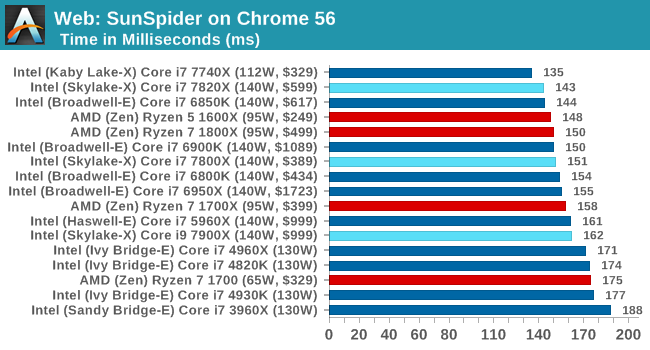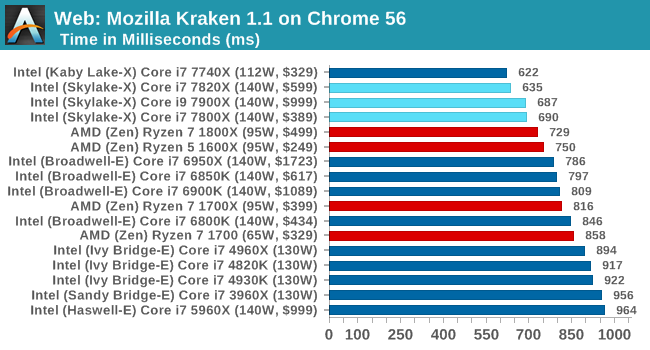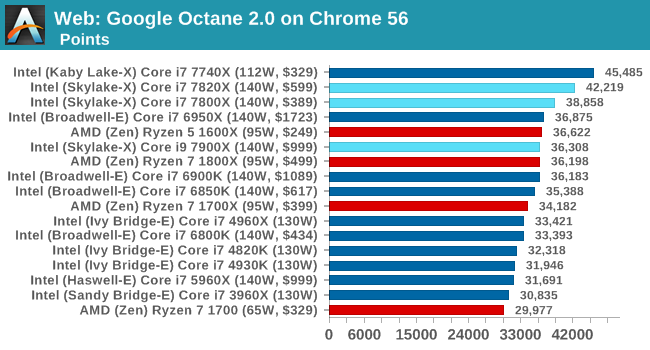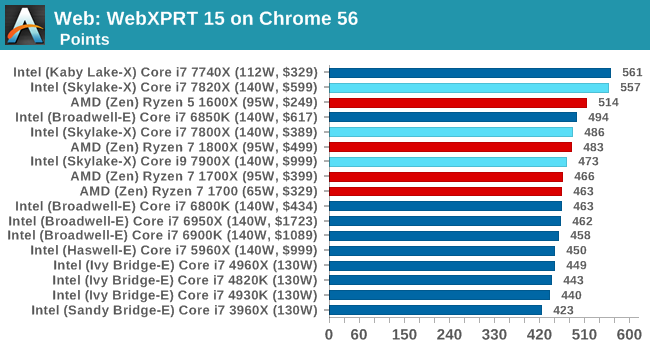The Intel Skylake-X Review: Core i9 7900X, i7 7820X and i7 7800X Tested
by Ian Cutress on June 19, 2017 9:01 AM ESTBenchmarking Performance: CPU Web Tests
One of the issues when running web-based tests is the nature of modern browsers to automatically install updates. This means any sustained period of benchmarking will invariably fall foul of the 'it's updated beyond the state of comparison' rule, especially when browsers will update if you give them half a second to think about it. Despite this, we were able to find a series of commands to create an un-updatable version of Chrome 56 for our 2017 test suite. While this means we might not be on the bleeding edge of the latest browser, it makes the scores between CPUs comparable.
SunSpider 1.0.2
The oldest web-based benchmark in this portion of our test is SunSpider. This is a very basic javascript algorithm tool, and ends up being more a measure of IPC and latency than anything else, with most high-performance CPUs scoring around about the same. The basic test is looped 10 times and the average taken. We run the basic test 4 times.

Sunspider goes after peak frequency most of the time, althoguh there is some variation as it moves into basically becoming a legacy test.
Mozilla Kraken 1.1
Kraken is another Javascript based benchmark, using the same test harness as SunSpider, but focusing on more stringent real-world use cases and libraries, such as audio processing and image filters. Again, the basic test is looped ten times, and we run the basic test four times.

Kraken is more of an intense attack on JS, and still regularly sorts by IPC and frequency.
Google Octane 2.0
Along with Mozilla, as Google is a major browser developer, having peak JS performance is typically a critical asset when comparing against the other OS developers. In the same way that SunSpider is a very early JS benchmark, and Kraken is a bit newer, Octane aims to be more relevant to real workloads, especially in power constrained devices such as smartphones and tablets.

Octane seems to be an optimization target, and with the new Skylake-X it shows.
WebXPRT 2015
While the previous three benchmarks do calculations in the background and represent a score, WebXPRT is designed to be a better interpretation of visual workloads that a professional user might have, such as browser based applications, graphing, image editing, sort/analysis, scientific analysis and financial tools.











264 Comments
View All Comments
Icehawk - Monday, June 19, 2017 - link
I'm curious to see AMD's response w/Threadripper but the 7820 is looking like the next CPU for me, I'm still on a 3770k and while it is just fine for gaming I've been converting all of my media to x265 and need a lot more muscle to speed that along. I do wish that heat was better controlled as my current system is near silent with a fanless PSU, an AiO water cooler, no mech drives, etc and overclocked to 4.4ghz.Pieter123456 - Monday, June 19, 2017 - link
Funny how you did not hold of on making a verdict when there were bios and 1080p gaming issues with ryzen launch??!Flying Aardvark - Monday, June 19, 2017 - link
Intel pays well for such courtesies. AMD, not so much. I heard people saying Ryzen was released defective.So the conclusion that AT should be making is that the new i7 and i9 lineup was released as defective.
tamalero - Monday, June 19, 2017 - link
I heard you, I still remember how fanboys and some "socialites" of the hardware sites bashed AMD nonstop on other issues, like the voltage issues on the Polaris chips.Nvidia has a problem too, and they arent even close to be that harsh.
Ryzen's cache issue? THE WORLD IS ENDING FOR AMD!!!
Intel's drop in performance core per core in some things? "not that bad, balance, etc..etc.."
Gothmoth - Tuesday, June 20, 2017 - link
the biggest issue is this insane heat skylake-x produces when overclocked.the bios issues can be resolved.
that anandtech is more biased towards intel should come as no surprise.
tamalero - Tuesday, June 20, 2017 - link
I noticed that, there is a huge difference in the wording on this article vs the one in tomshardware.And both show very different outcomes.
Specially in overclocking and power consumption. Where the corei9 is ridiculously inefficient.
Luckz - Tuesday, June 20, 2017 - link
"there is a huge difference in the wording"And knowing Tomshardware from decades ago, I would have expected the exact opposite.
Ryan Smith - Tuesday, June 20, 2017 - link
To be clear here, our Ryzen article didn't have any gaming coverage either.http://www.anandtech.com/show/11170/the-amd-zen-an...
That launch was based solely on desktop usage & compute, in big part because there were so many weird things going on with gaming. In this article we actually went one step further by specifically recommending that gamers not buy SKL-X for the time being.
Gothmoth - Tuesday, June 20, 2017 - link
but no really critical word about the crazy temps.how i am supposed to cool this cpu on air?
and no real critic that intel uses stupid thermal paste..... overall the critical stuff like crippled PCI lanes need to be adressed more agressive.
tamalero - Monday, June 19, 2017 - link
The TDP differences are insane!